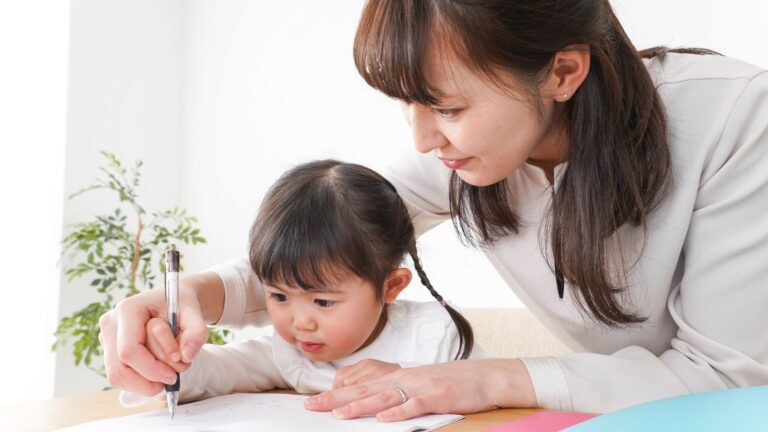According to UNICEF, a child will be in their early childhood education until they are eight years old. Scientists and linguists often note that early childhood education is the most important stage in a child’s life as important cognitive developments occur. At this period, a child’s brain is like a sponge, allowing them to absorb and process information in a fast manner. Parents are often told that they must be engaged in their child’s education while allowing the child to learn independently. Where exactly is the line drawn, then? Parents need to try to stay updated on their child’s learning and see how they can support it each day. This blog will assess the role a parent must play in their child’s early childhood education.
Why Do Parents Need to be Involved?

Although many kids go to preschool to learn, this should not mean that parents should leave everything to the teacher, believing that they are solely responsible for their child’s education. Instead, they need to check whether their child understands the lessons they learn each day and assist them at a pace that does not push the child too much. Here are some key reasons why parents need to play an active role:
To Make Learning a Positive Experience
The first time a child steps into the classroom is the first time they will be out in a different environment – one which they need to get used to. Being in an unknown environment can be scary. From having their parents beside them throughout the day to not seeing them at all for a few hours can at first be a huge distraction to the child. Hence, helping them to get settled and checking on their child’s educational progress when they get home is essential. Parents that tend to positively engage with their children by talking nicely and recognising their small achievements create an environment for their children to enjoy learning and expand their knowledge. Simple activities like reading a short story can greatly help kids to increase their vocabulary, pronunciation and comprehension.
Children feel more confident and content with learning when their parents encourage them to learn and improve. Hence, this may, in turn, encourage them to participate in learning activities within the classroom actively. This indicates that a child’s education extends beyond the school walls, and understanding this is extremely vital.
To Encourage Students to Move Away From Their Comfort Zone
A preschool would generally conduct outreach activities, providing educational institutes with many opportunities to invite parents to join and spend time in the preschool. While understandably, parents of this day and age could be busy with their hectic schedules, it is recommended that they attend at least a few of these events. This allows teachers to interact with parents and for teachers to understand family cultures, which provides a different dimension to teaching. It, for instance, helps the teacher understand what form of innovative teaching methods would be most effective and break away from cultural biases or move away from adopting teaching practices that have stereotyped specific cultures.
Parents attending such functions also receive an opportunity to talk exclusively with the teachers and understand their professional opinion on their child’s performance, abilities and interests. Note that a child’s education extends to social skills. One way to develop this is by allowing your child to interact with other people of their age in school. Hence, attending events provides a way for parents to see how well their child is going in terms of social skills.
To Gain Insights From Educational Experts
Parenting is not easy. There are many things one must learn about when raising a child. Hence, while parents do their best to meet their children’s needs, this does not make them experts in everything. This includes the field of education, where unless a parent comes from a teaching background, they would not be aware of the multi-faceted nature of early childhood education that deals with concepts like phonological awareness and numeracy. Teachers, in that sense, are the best people to assess and monitor whether a child of a certain age is keeping up with their educational, social and verbal skills on par with others. This means a teacher also requires parents to stay actively engaged in their child’s education because they recognise the limited role of the classroom.
Not a lot can be done within a few hours of a day. Thus, communicating and emphasising activities parents can do with their children at home allows parents to ensure what they are doing is correct and is directly meeting their child’s education needs. This way, parents can ensure their children are on the right track in their early childhood education.
How Can Parents Be More Engaged?

If a parent is not sure how they can further their role in helping their child reach the highest potential in their early development education period, here are some things to keep in mind:
Preschools Taking The Lead
While preschools recognise that education in the classroom is limited, parents may not be open to communicating with teachers for fear that it would offend them or that they lack confidence. To ensure that this does not hinder their child’s education, it is always good for preschools to reassure parents at the outset that they are open to communication. It is even more vital that teachers keep clear lines of communication. Hence, parents should feel comfortable enough to ask fundamental questions, whilst teachers should also comprehensively help parents understand the areas their child can improve and how they can help.
Help Parents To Figure Out What They Can Do
Being vague as ‘read a book with your child’ may not always be the best advice. Instead, recommending a few books and the amount of time that should be spent together is a helpful way for parents to measure whether they are doing enough. Busy parents especially may find this helpful to structure and schedule their day. In this respect, introducing parents to the curriculum and even having a specific guidance book may be a great way for parents of different backgrounds to ensure they are teaching their children in the right manner.
Parents Taking an Interest in Attending School Events
Children love their parent’s attention. Hence, the role parents play in building a child’s confidence is central to their early education stage. Due to this, parents need to make an effort to attend school events actively. This does not necessarily have to be restricted to attending a parent-teacher meeting but instead should include attending school concerts, plays, special events, and more. This ensures the child feels supported and motivates them to do well in all aspects. Instead of focusing on academia, children should feel recognised in their other skills, relating to sports, for instance, and creativity.
Parents Should Take Their Children on Educational Trips
Who says your child’s education has to be restricted to their schools and homes. Every outside interaction is a space to learn something new, and for a child who has barely seen the world, outside educational spaces offer something new to keep them engaged and curious. Go to the local museum, library, aquariums, discovery centres, gardens and more. This way, any form of education they learnt in class can be put into real-life environments. For example, in a child’s early education, they may learn about various animals and plants. Hence, visiting the zoo or elsewhere allows children to contextualise their learning.
Parents Should Talk to Their Children More
While usually, parents would ask the teacher how their child is performing whenever they meet them; they tend not to check with their children how their school day went. The best way to learn whether a child understood what they learnt is by listening to what they have to say. A good way to do this is by asking open-ended questions like how their day went at school or what was the hardest part of the day. This encourages children to reflect on their day and learn and communicate it to their parents.
Educational Institutes Have a Responsibility to Encourage More Parent Engagement

Since parents tend to believe they have done their responsibility the moment they send their child to preschool, it becomes the role of the educational institute to help parents understand the role they play in early childhood education. Hence, encouraging them not to stop their efforts in teaching their child and telling them how they can help is integral. One way to do this is by increasing parent engagement within the preschool itself. What all of this indicates is that parents need to have a cordial relationship with teachers. Thus, educational institutes should invest in solutions that can help reduce the communication gap between parents and teachers. Will you be an active advocate for each child’s educational journey, ensuring they receive a holistic educational experience with maximum parental engagement?






